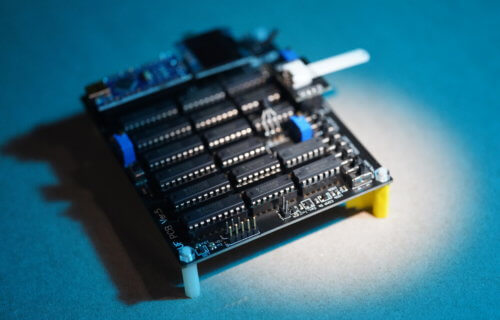‘Yes or no. You’re infected or not infected. You get the answer right away.’
GAINESVILLE, Fla. — An inexpensive COVID testing system could screen for the virus in just 30 seconds, researchers from the University of Florida say. Their study reveals that the new device is just as accurate as a PCR test, which has become the gold standard during the pandemic — but takes up to 24 hours for results to arrive.
Moreover, researchers say the new device costs just $50 to build and is reusable — unlike similar rapid testing devices which are trying to cut down waiting times for COVID patients.
“There is nothing available like it,” says Josephine Esquivel-Upshaw, D.M.D., a professor in the UF College of Dentistry, in a university release. “It’s true point of care. It’s access to care. We think it will revolutionize diagnostics.”
A COVID test that works like a diabetes monitor?
Study authors say they are still waiting for approval from the U.S. Food and Drug Administration, but their device has the same 90 percent accuracy of a PCR test and the same sensitivity as well.
The hand-held machine uses a simple 9-volt battery to power it and an inexpensive test strip to measure COVID levels. It’s similar to a blood glucose meter, but this one has coronavirus antibodies attached to a gold-plated film at its tip. Users place this strip on the tongue to collect a sample of their saliva.
From there, testers take the strip and insert it into a reader on the circuit board (the brains) of the device. If someone has COVID-19, the virus particles in the saliva start binding with the antibodies and “dance” as two electrical pulses prod them. If a patient has more of the virus in their saliva, it changes the voltage of the electrical pulses.
The machine takes this voltage signal and converts it to a numerical value — creating an “electrochemical fingerprint.” The numbers indicate either a positive or negative test result, with lower values signifying a larger virus load in the patient.
Researchers add that their device may also be able to examine protein markers and diagnose other conditions, including cancer, heart disease, and immune disorders.
Scientists started working on the device before COVID
Dr. Fan Ren, a distinguished professor in the Herbert Wertheim College of Engineering’s department of chemical engineering, notes that the team started working on this project long before the pandemic started in 2020. With nearly a million Americans dying from COVID-19, researchers shifted their focus to creating a testing strip that accurately tests for the virus.
“Almost a million people have died of COVID,” Ren says. “Those are so many tragedies. Old people. Young people. You name it. I said, ‘No, that’s it.’ That is too much.”
Study authors add that they’re not the only institution working on such a device, which uses a field effect transistor (FET). Those previous experiments, however, involved one-off machines which applies samples directly to the FET. This renders the transistor unusable after the first test.
The Florida team separated the transistor from the sample, just like glucose meters do by using testing strips to collect blood from diabetes patients. Researchers believe this makes the new device affordable and easy to use at venues with large crowds, like concerts and sporting events.
“Yes or no. You’re infected or not infected. You get the answer right away,” Ren concludes.

